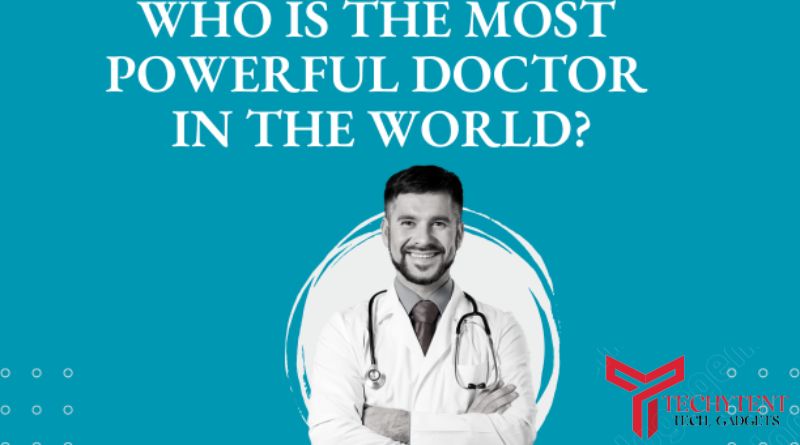The term “Most Powerful Doctor” evokes curiosity and intrigue. In a world where healthcare systems are interconnected with policy, technology, and economics, the definition of power transcends the conventional image of a skilled surgeon or an accomplished physician. Power in the medical realm encompasses influence over public health, policymaking, research advancements, and even global health decisions. In this article, we delve into what it means to be the world’s most powerful doctor, examining key figures and the profound impact they’ve had on healthcare worldwide.
What Defines the “Most Powerful Doctor”?
Power in the field of medicine is multifaceted. A doctor’s influence can stem from various factors, including:
- Global Reach: The ability to influence healthcare policies or practices on an international scale.
- Innovative Contributions: Groundbreaking research or advancements that revolutionize medical practices.
- Leadership Roles: Holding influential positions in global health organizations or governments.
- Public Trust: Establishing credibility and becoming a trusted voice in medical science and public health.
The most powerful doctor is not necessarily the one with the most patients but the one whose decisions, innovations, and leadership shape the future of healthcare for millions or even billions of people.
Key Figures in the World of Medicine
Dr. Tedros Adhanom Ghebreyesus
As the Director-General of the World Health Organization (WHO), Dr. Tedros Adhanom Ghebreyesus holds one of the most influential positions in global health. Since his election in 2017, he has overseen the organization’s response to major global health challenges, including the COVID-19 pandemic. His leadership has been pivotal in shaping international health policies, coordinating global responses to health emergencies, and advocating for universal healthcare.
Dr. Tedros’s background as a public health expert and former Minister of Health in Ethiopia has equipped him with the expertise to navigate complex global health issues. Under his tenure, WHO has emphasized the importance of equity in healthcare, addressing disparities that disproportionately affect low-income countries.
Dr. Anthony Fauci
Dr. Anthony Fauci is a household name, particularly in the United States, where he has served as a leading immunologist and the director of the National Institute of Allergy and Infectious Diseases (NIAID) since 1984. His role in managing the U.S. response to infectious diseases such as HIV/AIDS, SARS, Ebola, and COVID-19 has cemented his reputation as one of the most trusted voices in medicine.
Dr. Fauci’s scientific contributions, including extensive research on immune responses and vaccines, have had a lasting impact on public health. His ability to communicate complex medical information in an accessible manner has earned him public trust, making him a key figure in both science and policy.
Dr. Devi Shetty
Often referred to as the “Henry Ford of Heart Surgery,” Dr. Devi Shetty is a renowned cardiac surgeon and healthcare entrepreneur from India. He is the founder of Narayana Health, a network of hospitals that has revolutionized affordable healthcare in India and beyond. Dr. Shetty’s innovative approaches to reducing the cost of surgeries without compromising quality have made life-saving procedures accessible to thousands of patients.
In addition to his surgical expertise, Dr. Shetty’s advocacy for universal health insurance in India has influenced policy changes and improved access to healthcare for millions. His work exemplifies the power of combining medical skill with visionary leadership.
The Role of Technology in Medical Power
In the 21st century, technological advancements have become a cornerstone of medical influence. Doctors who harness the power of technology to innovate and transform healthcare systems often find themselves at the forefront of the field. For example:
- AI and Big Data: Physicians who leverage artificial intelligence and big data analytics to improve diagnostics and patient outcomes are shaping the future of medicine.
- Telemedicine: The rise of telehealth has expanded the reach of medical professionals, enabling them to provide care across borders.
- Medical Devices and Innovations: Doctors involved in developing cutting-edge medical devices, such as robotic surgery systems or wearable health monitors, are redefining patient care.
The Intersection of Medicine and Policy
The most powerful doctors often operate at the intersection of healthcare and policy. Their influence extends beyond clinical practice to shape laws, regulations, and funding priorities that impact public health. Examples include:
- Dr. Margaret Chan: As the former Director-General of WHO, Dr. Chan played a crucial role in addressing global health challenges such as pandemics and chronic diseases.
- Dr. Sanjay Gupta: While not a policymaker, Dr. Gupta’s role as a medical correspondent for CNN has influenced public opinion on health issues, highlighting the power of media in shaping health narratives.
Measuring Impact: Beyond Titles and Positions
While titles and positions provide an indication of influence, the true measure of a doctor’s power lies in the tangible impact of their work. This includes:
- Lives Saved: Direct contributions to improving patient outcomes and saving lives.
- Policy Changes: Advocacy efforts that lead to lasting changes in healthcare systems.
- Education and Mentorship: Training the next generation of medical professionals and fostering innovation.
- Public Awareness: Raising awareness about critical health issues and influencing behavior.
Challenges Faced by Influential Doctors
With great power comes great responsibility, and the world’s most powerful doctors face unique challenges:
- Public Scrutiny: High-profile medical professionals are often subject to intense public and media scrutiny.
- Ethical Dilemmas: Balancing individual patient care with broader public health priorities can be complex.
- Global Inequities: Addressing health disparities in a world of unequal resources requires innovative solutions and unwavering commitment.
Conclusion: Defining Power in Medicine
The title of the “Most Powerful Doctor” is not just about accolades or authority. It reflects a combination of expertise, leadership, and the ability to make a meaningful difference in the lives of people around the world. From global health leaders like Dr. Tedros Adhanom Ghebreyesus to innovative pioneers like Dr. Devi Shetty, these individuals exemplify the diverse ways in which doctors can wield power to transform healthcare.
As the medical field continues to evolve, new leaders will emerge, equipped with the tools of technology, the insights of data, and a commitment to equity. The true legacy of the most powerful doctors lies in their impact—not just on their patients, but on the entire global healthcare landscape.
May Also Read:





